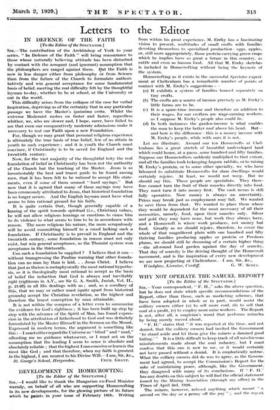Letters to the Editor
IN DEFENCE OF THE FAITH [To the Editor of the SPECTATOR.]
• Sni,—The contribution of the Archbishop of York to your . series, " In Defence of the Faith " will bring reassurance to those whose naturally believing attitude has been disturbed by contact with the arrogant (and ignorant) assumption that the philosophers are ranged against them. But the Faith is now in less danger either from philosophy or from Science than from the failure of the Church to formulate authori- tatively and win general acceptance for some fundamental basis of belief, meeting the real difficulty felt by the thoughtful layman to-day, whether he be at school, at the University or out in the world.
This difficulty arises from the collapse of the case for verbal
Inspiration, depriving us of the certainty that in any particular passage we have the Master's ipsissima verbs. Whilst the extreme Modernist rushes on faster and faster, regardless whither, we, who are slower and, I hope, surer, have failed to see that even our comparatively moderate admissions make it necessary to rest our Faith upon a new Foundation.
For, though we may grant that personal religious experience is ultimately the true basis of true belief, few of -us attain in youth to such experience ; and it is youth the Church must convince, if Christianity is to be saved for England and the twentieth century.
Now, for the vast majority of the thoughtful laity the real foundation of belief in Christianity has been not the authority of the Church but the teaching of the Master. Jesus is so incontestably the best and truest guide to be found among men, that it has been felt to be rational to accept His state- ments, even if some of them seemed " hard sayings." But now that it is agreed that many of these sayings may have been erroneously attributed to Jesus, that historical foundation is no longer secure. And the English layman must have what seems to him rational ground for his faith.
It is quite certain that, though generally capable of a
leaning of the spirit towards spiritual (i.e., Christian) values, he will not allow religious leanings or emotions to cause him to do violence to what seems to him to be in accordance with reason. The more religious his nature, the more scrupulously will he avoid committing himself to a creed lacking such a foundation. If Christianity is to prevail in England and the twentieth century, some foundation in reason must not only exist, but win general acceptance, as the Thomist system won acceptance in the thirteenth.
Can such a foundation be supplied ? I believe that it can— without transgressing the Pauline warning that other founda- tion can no man lay than is laid. . . Jesus Christ. I believe that just as theism is metaphysically the most rational hypothe- sis, so it is theologically most rational to accept as the basis of belief the induction that God is always and inevitably right (righteous in A.V., see Sir G. A. Smith, Isaiah, Vol. II., p. 214ff) in all His dealings with us ; and, as a corollary of this, that we may or rather must (quite apart from historical grOunds) accept the Christian revelation, as the highest and therefore the truest conception by Man attainable.
It is not within the compass of a letter even to summarize the evidence for God's rightness ; it has been built up step by step with the advance of the Spirit of Man, has found expres- sion in the attribution of fatherhood to God and was definitely formulated by the Master Himself in the Sermon on the Mount. Expressed in modern terms, the argument is something like this :—I must either regard the Universe as " blind " and " mad," affording me no guidance whatsoever, or I must act on the assumption that the leading I seem to sense is absolute and absolutely reliable ; that the highest I can conceive or learn is the most like God ; and that therefore, when my faith is greatest in the highest, I am nearest to his Divine Will.—I am, Sir, &e,
St. George's School, Harpenden. • CECIL GitAvr.
























































 Previous page
Previous page